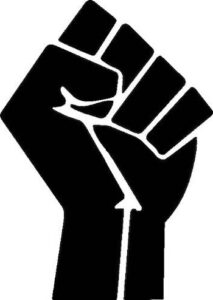
*On this date in 1961, the Revolutionary Action Movement (RAM) is affirmed. RAM was a Marxist-Leninist, Black nationalist organization.
They were the first group to apply the philosophy of Maoism to the conditions of Black people in the United States. They informed the revolutionary politics of the Black Power movement. Group formation. In 1961, students at Central State University, a historically black university in Ohio, came together to form "Challenge," a small conglomerate group of Students for a Democratic Society (SDS), Congress of Racial Equality (CORE), and Student Nonviolent Coordinating Committee (SNCC).
Comprised mainly of formerly expelled students and veteran activists, Challenge was created to further political awareness, particularly about the Black community. At the request of Donald Freeman, Challenge read Harold Cruse's essay "Revolutionary Nationalism and the Afro-American". It thereafter shifted its focus from educating its participants to creating a mass black working-class nationalist movement in the North. After this drastic agenda change, Challenge soon evolved into the Reform Action Movement, as they believed using the word revolutionary would stir fear in the university administration.
Led by Freeman, Wanda Marshall, and Maxwell Stanford, RAM became a study/action group that hoped to turn the Civil Rights Movement into a worldwide black revolution. RAM had three main branches: the founding branch in Cleveland, Ohio; the headquarters in Philadelphia, Pennsylvania; and a west coast branch in Oakland, California. Though the branches had different local goals and accomplished different things, RAM engaged in several unifying national political activities. All branches helped distribute Robert Williams' magazine, The Crusader, after being banned in the United States.
They also took a two-pronged approach to advocating their policies among other civil rights groups: disparaging those that did not advocate for armed self-defense and, simultaneously, infiltrating them to try to spread their revolutionary ideology. Because RAM was made up of mostly college-educated intellectuals (though many dropped out to organize full-time), they thought a lot about who they were trying to mobilize, eventually settling upon the black petit-bourgeoisie youth and black working-class youth. RAM thought that the black petit-bourgeoisie particularly embodied the contradictions of racial capitalism. If properly brought into the movement, this group could form a "revolutionary intelligentsia capable of leading black America to true liberation."
They used public street meetings to try to attract as many black working-class youth as possible to their organization, particularly gang members. RAM thought gang members had the most revolutionary potential of the population because they could be trained to fight not against each other but against white power structures. They believed they could create a fighting force of former gang members on the model of the Congolese Youth guerrilla army and the Mau Mau guerrillas.
In mid-1965, before opposition to the Vietnam War gained momentum, RAM aligned ideological solidarity with the Vietnamese National Liberation Front in their fight against imperialism. RAM was explicitly anti-draft, arguing and organizing around the hypocrisy of drafting Blacks to fight in a war against, in their eyes, other people victimized by U.S. imperialism. The Black Guard, in Max Stanford's words, "Was to stop our youth from fighting amongst themselves, teach them a knowledge of Black history ... and prepare them ... to protect our community from racist attacks." Except for Philadelphia, RAM operated as a semi-clandestine group, existing behind front organizations and under multiple names and branches. Due to this underground status, RAM focused more on producing agitprop and less on community organizing. As a result, RAM received less attention from historians than the Black Panther Party, even though it heavily influenced the Panthers.
RAM was the only secular political organization that Malcolm X joined before 1964. The group's political formation deeply influenced the politics of future influential Black Panther Party founders and members. In the context of government repression, RAM transformed itself into the Black Liberation Party and, by 1969, had practically dissolved. Many of its members went back to their communities or joined other civil rights groups to continue pushing their ideology of black internationalism and armed self-defense.